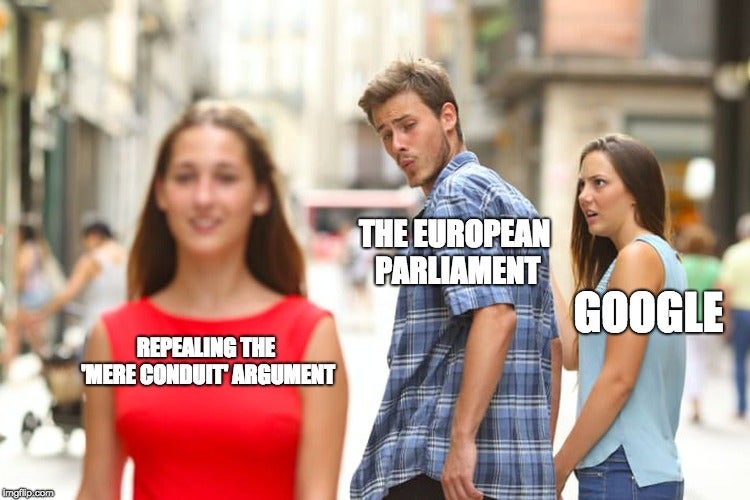EU will kill small publishers, not memes, with Article 13, says Google

In the wake of the European Parliament agreeing on the text of new copyright laws, Google warns that the proposed Digital Single Market rules, specifically Article 13 of that Directive, will result in the over-blocking of content and will punish smaller publishers more than bigger fish like itself.
Google’s senior vice president of global affairs Kent Walker said in an article that while platforms acting in good faith won’t be penalised every time a user uploads a piece of copyrighted content, unspecified limitations mean that publishers and platforms without deep pockets will likely be overly cautious.
The Directive, which is due to be voted on at the end of this month, or early in April, is designed to close a perceived value gap, where, a user may upload someone else’s content to YouTube, Facebook, or any online platform and have it watched or read several thousand times before the real rights holders issue a takedown notice. This will see platforms no longer regarded as mere conduits of content, but actively responsible for what happens in their neighbourhoods.
Related: Best laptop
Google, Facebook and others would in theory have to license copyright-protected material from the rights holders before hosting it. In practice, Google says that this will require platforms to put content filters in place, like YouTube’s own Content ID system, to monitor what content users are uploading.
Writing in a post subtitled One Steps Forward, Two Steps Back, Walker broadly welcomed changes which mean that platforms won’t be fined for each and every copyright-infringing upload, but added: “…the directive creates vague, untested requirements, which are likely to result in online services over-blocking content to limit legal risk…
“Article 13 could impact a large number of platforms, big and small, many of them European. Some may not be able to bear these risks. This would be bad for creators and users, who will see online services wrongly block content simply because they need to err on the side of caution and reduce legal risks.”
The EU has consistently stated that there are exemptions for smaller publishers and platforms, with Axel Voss MEP for the European People’s Party, saying: “If you don’t have a ten million [Euro] global turnover, or if you have not more than five million unique monthly visitors, then you are a little bit exempted from this Article 13.”
Newer companies, which have been operating for less than three years, will also be exempted from having to obtain authorisation from rights holders or proactively filter content, although upon receipt of a takedown notice issued by a court order (or equivalent), said companies must comply, as they would now.
But as companies age, grow in size, and revenue (i.e. not profit) inches over that €10m (£8.5m) mark, there is a concern that a companies without the means to develop their own systems will be stuck between having to cough up the cash – Google claims that it’s spent over $100m (£75.8m) on developing and running Content ID – or prepare to lawyer up.
Related: Best VPN
Germany’s Federal Commissioner for Data Protection and Freedom of Information Ulrich Kelber predicts that smaller companies will instead pick off-the-shelf solutions from larger IT companies – like Google and Facebook.
NB – this translation of Kelber’s original comments was created by Florian Mueller of FOSS Patents, and has been approved as correct by the Federal Commissioner for Data Protection and Freedom of Information.
“Instead, [smaller companies] will utilize offerings by large IT companies just the way it is already happening, for one example, in the field of analytics tools, where the relevant components created by Facebook, Amazon and Google are used by many apps, websites, and services,” Kelber said.
“At the end of the day, this would result in an oligopoly consisting of a few vendors of filtering technologies, which would then be instrumental to more or less the entire Internet data traffic of relevant platforms and services.”
The Directive, intended to remunerate creators by making larger platforms pay, may, ironically, see these same platforms strengthened.
One thing is certain, Article 13 will not ban memes. The European Parliament states that the “free uploading and sharing of works for the purposes of quotation, criticism, review, caricature, parody or pastiche” means that you’ll be free to engage in as much Simpsons Bortposting as your Internet connection can handle.
Something that’s less certain is the bearing that the Directive will have on UK-based companies in the long term – depending on the shape Brexit eventually takes, for users and businesses in the UK, all of the above may very well end up being academic.
Is the EU overreaching in its attempt to force Google and others to licence content, or should web giants be forced to better police their back yards? Let us know on Twitter @TrustedReviews.


